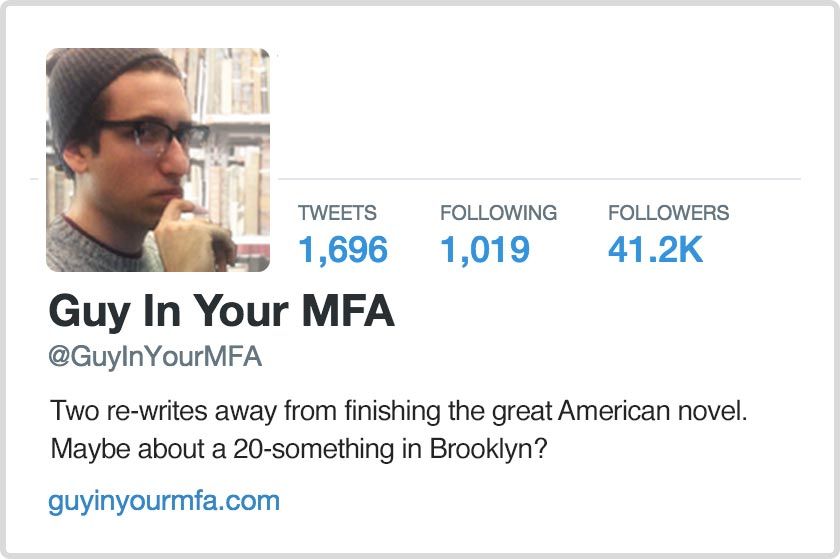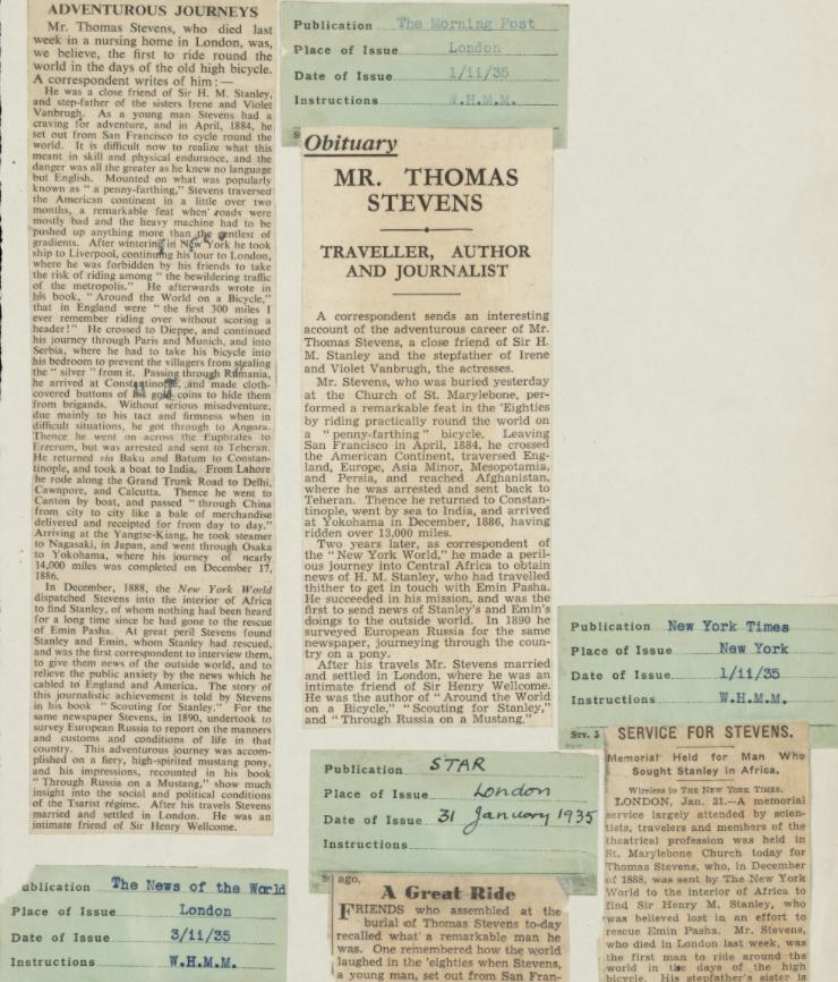One pretentious, mansplaining, literary tweet at a time, Guy In Your MFA has become an internet phenomenon. Run by Dana Schwartz, since its inception last year the Twitter parody account has been named one of Paste’s 75 Best Twitter Accounts of 2014 and has garnered over 50,000 followers. Dana talked with The Curator about comedy, Twitter, and the literary jerks we all love to hate. This conversation has been edited for publication.
You used a hyphen where it should've been an em dash, so I really can't take your story seriously. Do you honestly not know the difference?
— Guy In Your MFA (@GuyInYourMFA) April 15, 2015
Adam Joyce: What do you do officially?
Dana Schwartz: I’m a student at Brown. So officially what I do on a daily basis is try to make it to graduation without failing out. I study public policy, and I was actually pre-med for a majority of my time at Brown. I made it through organic chemistry, physiology, everything, until last summer when I had my internship at Conan in Los Angeles.
I just fell in love; it was really a round peg-round hole scenario. I had been going full speed ahead with medical school without realizing that what I really loved to do was write, be funny, and try to make things to put out to the world. And I’m really happy that I have a physical project going. So that sort of changed my path – it was a fun conversation to have with my parents.
AJ: Were your parents supportive of the shift? Or was there a long arc to convincing them?
DS: My parents were actually ridiculously supportive, almost ludicrously supportive, especially because they don’t think I’m very funny. So they don’t understand what I do at all. They don’t understand Twitter and I don’t think my humor is their cup of tea. The fact they are still supporting and have faith in my abilities sort of makes it even nicer.
AJ: Are you planning on doing an MFA? Is that the trajectory at this point?
DS: I was planning on it. I took a lot of fiction writing classes. I love writing fiction. Guy In Your MFA (Guy) was born out of a big stack of pieces I needed to critique for the next day and my frustration with this whole culture of pseudo-pretentious literary works, both in myself and in my colleagues.
I had also been researching MFA programs, reading a ton of the journals they put out, reading a lot of very MFA stories, which are their own sort of subgenre. That is sort of how I educated myself into this world. But, actually, at the moment I am not planning on getting one. But I didn’t talk myself out of it through Twitter.
AJ: So it’s not like you mocked your way out of wanting to do an MFA?
DS: I wear the hat that is used in Guy’s image. I have it and I wear it all the time.
AJ: Are you hoping the Twitter personality accomplishes anything? It came out of a humorous venting about this space, but has clearly touched a nerve. Do you have hopes for what it means beyond the venting?
DS: It has already accomplished an incredible amount for me personally. It got me attention from the literary world, an agent, and put me in touch with editors and publishers. And it helped me establish that comedy was something that I was actually capable of doing.
I’ve used it as a starting off point. I started a second parody Twitter account, which was basically to avoid doing real schoolwork. It’s called DystopianYA and is another twist on a genre type. It has been fun for me to practice recognizing and twisting tropes, and whether anything comes directly of those projects or whatever the next step might be, the really important thing is that it has set me up skill-wise and with contacts. So I can work hard and make something really cool for my next project.
Finished another moleskine. It'll go where all of my used notebooks go – scattered visibly in my room for girls to pick up and page through
— Guy In Your MFA (@GuyInYourMFA) April 21, 2015
AJ: So are there any categories you are hoping to tackle next? Are there any tropes in the on deck circle for mockery?
DS: I wish. I think I have to give up the trope Twitter account though. Or else that will become my “thing,” and I’m hoping to branch out from 140 characters.
AJ: That could become another trope to critique at some point.
DS: Right! You become the girl that spends too much time on Twitter, and that is its own embarrassing sub-genre.
AJ: The infinite regress of Twitter parody accounts that come out of it?
DS: You keep going too deep and looking from mirror to mirror to mirror.
AJ: Have you ever received any pushback over the character?
DS: The good news is not too much. Most people recognize it is a loving parody and that it doesn’t come from an antagonistic or vindictive place. I am a fiction writer; it is something I love to do. Part of the reason I can get into Guy’s head so well is because I have some of that in me. I think all writers kind of do. Whether you grew out of it at 16 or you think you did, we all sort of have that deep down idea that our thoughts matter more than everyone else’s. Or that maybe we understand “Howl” just a little better than Allen Ginsberg.
So no, there has not been a lot of pushback, which makes me very happy. I’ve never hoped to make comedy just for the sake of offending people. I hope people recognize it comes from a place of love. Although the pushback I do get is hilarious and is only from people who don’t understand what it is. For example, I’ll have Guy say something moderately racist or incredibly Texan and some people are flabbergasted at how terrible a human being I am.
My favorite story is about one conversation with a man in real life. There was an article about Guy on my campus, and I was talking about it, and he clearly didn’t know I wrote Guy In Your MFA. He said, “Oh yeah, Guy In Your MFA, I feel like you can only understand it if you are a male writer. It’s talking to a really masculine sensibility.” And he went on to say: “It’s funny for everyone, but it really captures something for male writers to especially relate to.” And I was like, this is so great, almost what I had always wanted. I’ve made it if a man is explaining what I’ve made to me. This is the peak.
So many footnotes. Footnotes within the footnotes. Footnotes within the endnotes.
— Guy In Your MFA (@GuyInYourMFA) December 15, 2014
AJ: There is always a lot of talk about the cultural consequences of comedy. But this is a moment, where at least people are responding to what Guy exposes and agreeing that this pretentious little voice inside needs to be mocked.
DS: I think part of the power of that literary guy is that he is really intimidating a lot of the time. His goal is to make the people around him feel intellectually insecure. So I think there is power of being able to put into the world the idea how, “Ugh this guy is so frustrating and ridiculous.” And to have a chorus of people come back and say, “Yes, we know,” as opposed to sitting in the corner of your workshop being nervous because he made a snide comment about how you didn’t read Dostoevsky in the original Russian.
Which I did, I should make very clear…
Yeah no, I actually barely read it in English.
In terms of the cultural consequence of comedy I love someone like John Oliver, who can use humor to draw attention to something really important and call it out in a really visible way. One thing I struggled with when I went from pre-med student to comedy writer was whether I was still doing “capital-G good” in the world anymore. And so it became important to me find places where I could still feel good about what I was doing and feel I was having an impact on the world. At the moment that means calling out things that annoy me and things that should change, like how women are treated in comedy.
I was at Conan for an entire summer, and there was not a single sketch with a female character. That bummed me out. Even really modern places like ClickHole, which I adore, has no female staff writers. Or someone as prolific and as incredible as Jerry Seinfeld says something ignorantly dismissive like, “It doesn’t matter where comedy comes from whether it is a man, a woman, or a man of color.” And this was after he got pushback for only having white male comedians on his show for the first season. It made me angry, because there is absolutely a difference in terms of how comedy is perceived coming from a female mouth versus coming from a male mouth, and that is absolutely what I want to draw attention to and try to change.
AJ: So Guy In Your MFA is like a painful medicine?
DS: Yes, some conversations are hard to have but that doesn’t mean they are any less important. It probably means they are more important.
AJ: And humor is a way to make those conversations, not necessarily less painful, but maybe a spoonful of sugar makes the medicine go down? Yet Disney might not be the best place to go for a philosophy of comedy.
DS: But Disney is a whole other realm of horrible stereotypes and tropes.
I do wonder if Guy In Your MFA comes off as some crazy feminist man hater trying to make all literary white men look bad. When the fact that matters is that Guy just happens to be an identity that is most often put on by straight white males. It’s like when people got mad at Lena Dunham when she wrote that piece about her Jewish boyfriend, because she’s not obviously Jewish. It’s like I’m not allowed to make fun of men because I’m not a man.
AJ: The odd idea that you are only allowed to make fun of those you are exactly like?
DS: Which is why I’m merciless when it comes to my family.
AJ: Maybe that is why they don’t think you are funny?
DS: Probably because I’m not very fair to them.
AJ: If we could switch gears, I’d like to ask you a few questions in character if possible.
DS: Let’s do it. Let me quick put on a hat and some fake glasses to get in character. I don’t wear glasses, but I feel like it would be “on brand” for me.
AJ: So if you could travel back in time and share a whiskey with one writer, who would it be and why?
Guy in Your MFA: Ernest Hemingway. Because I feel that the gritty experience of war cannot be accurately conveyed through literature. His thoughts are only fully experienced in conversation. We could share a drink and stories of love lost.
AJ: So this links up great with the next question. When I read Ernest Hemingway, for some reason I always want to drink red wine. What does reading Hemingway make you want to do?
Guy in Your MFA: Well obviously I know why it makes you want to drink red wine. That is a pretty pedestrian reading of what I assume to be The Sun Also Rises in which he goes to Spain. It is a simple jump from Spain to red wine, so I can’t quite fault you there. However, it makes me want to get out and experience war, to kill large animals for sport in order to reaffirm what it means to be a man. It makes me want to hold a woman, travel the world, and get drunk. But more than that it makes me want to write.
A good short story needs to be explicitly sexual, violent, or completely plotless. preferably all three.
— Guy In Your MFA (@GuyInYourMFA) March 29, 2015
AJ: Do you have any advice for young white writerly males?
Guy in Your MFA: I would assume if you need advice then you are not a real writer. Real writers are always writing, it is not something they work at or seek to achieve, it is something they are burdened with. The ability to write is a gift. Not all possess it, but those who do would never need advice from a fellow weaver of words.




